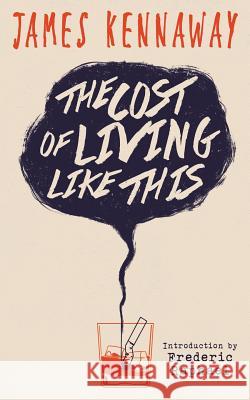The Cost of Living Like This (Valancourt 20th Century Classics) » książka
The Cost of Living Like This (Valancourt 20th Century Classics)
ISBN-13: 9781941147283 / Angielski / Miękka / 2014 / 154 str.
"Kennaway's best book. More than any of his other books, it testifies to his extraordinary poetic talent and the power of his human insight." - John le Carre
"If there is any justice at all . . . Kennaway's stock will rise posthumously. He could, after all, write rings around many of his more famous contemporaries. And is it too much to hope that he will be remembered at least partly as the author of "The Cost of Living Like This," his last and probably best novel?" - "Life Magazine"
"A moving and serious book, the harrowing theme is heightened by Kennaway's extraordinary ability to convince us that what he is saying appears not only real but true." - "Spectator"
"A solid, sentient piece of work . . . a satisfactorily rich novel." - "The Observer"
"They were painting the gothic corridors of the railway hotel when the economist arrived. It was about six o'clock in the evening, early in May, which is no time to die . . ." Thus opens this extraordinary book, the story of Julian, 37, an economist who has learned he is dying of lung cancer and has only a short time left to live. Racked with constant pain that is only partially assuaged by copious amounts of alcohol and drugs, Julian faces the loneliness of approaching death as his marriage with Christabel is made strained and difficult by the knowledge of his illness. When he meets seventeen-year-old Sally Cohen, exuberant and full of life, he sees a chance to live more fully until the end and embarks on a passionate affair, with devastating consequences for Julian and both of the women who love him . . .
James Kennaway (1928-1968) was the acclaimed author of several novels and screenplays, including "Tunes of Glory" (1956), which he adapted for a classic film starring Alec Guinness. Kennaway's untimely death cut short a brilliant career, but he is now being rediscovered as a major figure in modern Scottish fiction. This edition of his posthumous masterpiece "The Cost of Living Like This" (1969) features an introduction by Frederic Raphael."
"Kennaways best book. More than any of his other books, it testifies to his extraordinary poetic talent and the power of his human insight." - John le Carré
"If there is any justice at all . . . Kennaways stock will rise posthumously. He could, after all, write rings around many of his more famous contemporaries. And is it too much to hope that he will be remembered at least partly as the author of The Cost of Living Like This, his last and probably best novel?" - Life Magazine
"A moving and serious book, the harrowing theme is heightened by Kennaways extraordinary ability to convince us that what he is saying appears not only real but true." - Spectator
"A solid, sentient piece of work . . . a satisfactorily rich novel." - The Observer
They were painting the gothic corridors of the railway hotel when the economist arrived. It was about six oclock in the evening, early in May, which is no time to die . . . Thus opens this extraordinary book, the story of Julian, 37, an economist who has learned he is dying of lung cancer and has only a short time left to live. Racked with constant pain that is only partially assuaged by copious amounts of alcohol and drugs, Julian faces the loneliness of approaching death as his marriage with Christabel is made strained and difficult by the knowledge of his illness. When he meets seventeen-year-old Sally Cohen, exuberant and full of life, he sees a chance to live more fully until the end and embarks on a passionate affair, with devastating consequences for Julian and both of the women who love him . . .
James Kennaway (1928-1968) was the acclaimed author of several novels and screenplays, including Tunes of Glory (1956), which he adapted for a classic film starring Alec Guinness. Kennaways untimely death cut short a brilliant career, but he is now being rediscovered as a major figure in modern Scottish fiction. This edition of his posthumous masterpiece The Cost of Living Like This (1969) features an introduction by Frederic Raphael.











